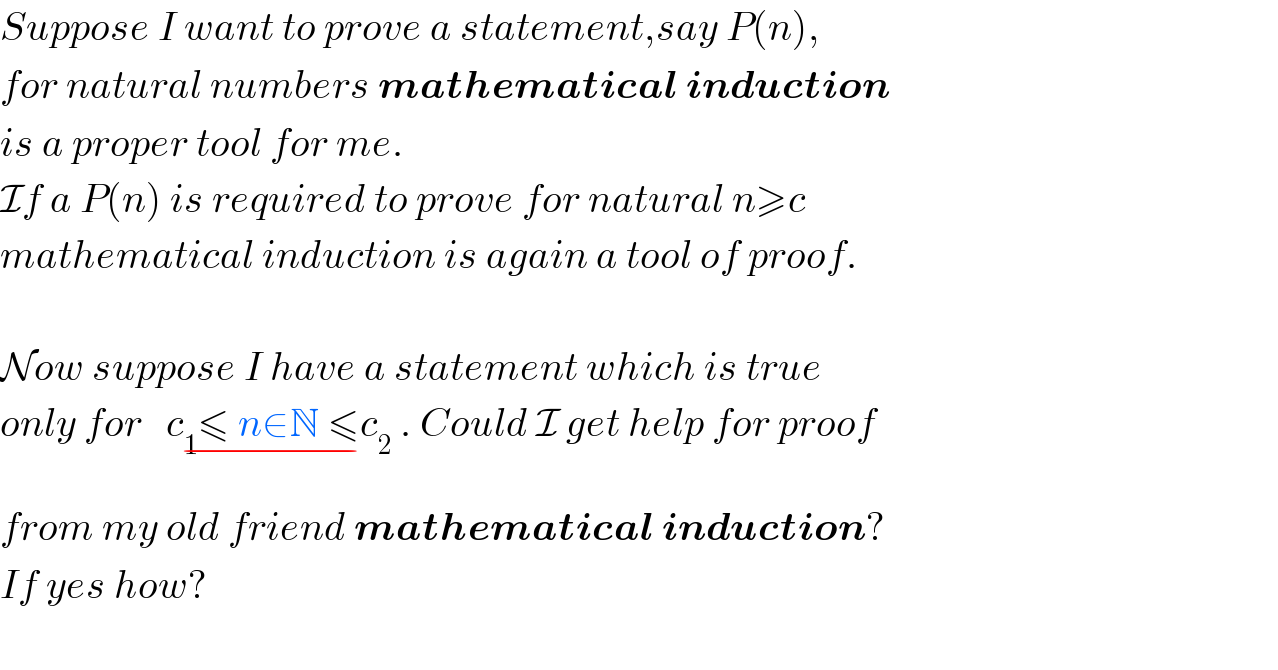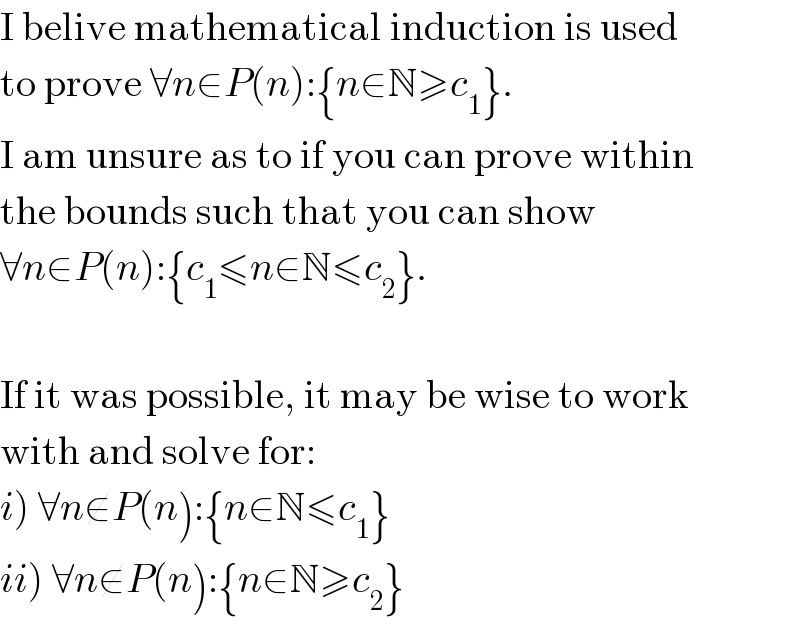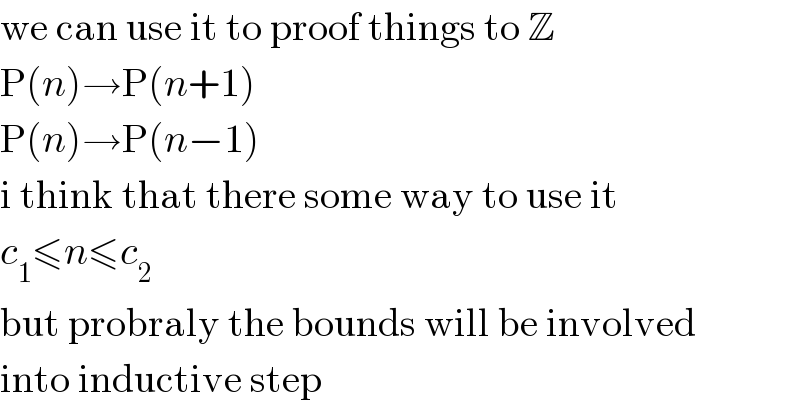
Question Number 2936 by Rasheed Soomro last updated on 30/Nov/15

$${Suppose}\:{I}\:{want}\:{to}\:{prove}\:{a}\:{statement},{say}\:{P}\left({n}\right),\: \\ $$$${for}\:{natural}\:{numbers}\:\boldsymbol{{mathematical}}\:\boldsymbol{{induction}} \\ $$$${is}\:{a}\:{proper}\:{tool}\:{for}\:{me}. \\ $$$$\mathcal{I}{f}\:{a}\:{P}\left({n}\right)\:{is}\:{required}\:{to}\:{prove}\:{for}\:{natural}\:{n}\geqslant{c}\: \\ $$$${mathematical}\:{induction}\:{is}\:{again}\:{a}\:{tool}\:{of}\:{proof}. \\ $$$$ \\ $$$$\mathcal{N}{ow}\:{suppose}\:{I}\:{have}\:{a}\:{statement}\:{which}\:{is}\:{true} \\ $$$${only}\:{for}\:\:\underset{−} {\:{c}_{\mathrm{1}} \leqslant\:{n}\in\mathbb{N}\:\leqslant{c}_{\mathrm{2}} }\:.\:{Could}\:\mathcal{I}\:{get}\:{help}\:{for}\:{proof}\: \\ $$$${from}\:{my}\:{old}\:{friend}\:\boldsymbol{{mathematical}}\:\boldsymbol{{induction}}? \\ $$$${If}\:{yes}\:{how}? \\ $$$$ \\ $$
Commented by Filup last updated on 01/Dec/15

$$\mathrm{I}\:\mathrm{belive}\:\mathrm{mathematical}\:\mathrm{induction}\:\mathrm{is}\:\mathrm{used} \\ $$$$\mathrm{to}\:\mathrm{prove}\:\forall{n}\in{P}\left({n}\right):\left\{{n}\in\mathbb{N}\geqslant{c}_{\mathrm{1}} \right\}. \\ $$$$\mathrm{I}\:\mathrm{am}\:\mathrm{unsure}\:\mathrm{as}\:\mathrm{to}\:\mathrm{if}\:\mathrm{you}\:\mathrm{can}\:\mathrm{prove}\:\mathrm{within} \\ $$$$\mathrm{the}\:\mathrm{bounds}\:\mathrm{such}\:\mathrm{that}\:\mathrm{you}\:\mathrm{can}\:\mathrm{show} \\ $$$$\forall{n}\in{P}\left({n}\right):\left\{{c}_{\mathrm{1}} \leqslant{n}\in\mathbb{N}\leqslant{c}_{\mathrm{2}} \right\}. \\ $$$$ \\ $$$$\mathrm{If}\:\mathrm{it}\:\mathrm{was}\:\mathrm{possible},\:\mathrm{it}\:\mathrm{may}\:\mathrm{be}\:\mathrm{wise}\:\mathrm{to}\:\mathrm{work} \\ $$$$\mathrm{with}\:\mathrm{and}\:\mathrm{solve}\:\mathrm{for}: \\ $$$$\left.{i}\right)\:\forall{n}\notin{P}\left({n}\right):\left\{{n}\in\mathbb{N}\leqslant{c}_{\mathrm{1}} \right\} \\ $$$$\left.{ii}\right)\:\forall{n}\notin{P}\left({n}\right):\left\{{n}\in\mathbb{N}\geqslant{c}_{\mathrm{2}} \right\} \\ $$
Commented by Filup last updated on 01/Dec/15

$$\mathrm{I}\:\mathrm{don}'\mathrm{t}\:\mathrm{know}\:\mathrm{much}\:\mathrm{of}\:\mathrm{this}\:\mathrm{topic}\:\mathrm{to}\:\mathrm{be} \\ $$$$\mathrm{of}\:\mathrm{any}\:\mathrm{help}.\:\mathrm{S}{orry} \\ $$
Commented by Rasheed Soomro last updated on 01/Dec/15

$$\mathcal{Y}{es}\:{Filup}\:{you}\:{are}\:{right}. \\ $$$${In}\:{the}\:{mentioned}\:{case}\:{mathematical}\:{induction} \\ $$$${couldn}'{t}\:{help}. \\ $$
Commented by 123456 last updated on 02/Dec/15

$$\mathrm{we}\:\mathrm{can}\:\mathrm{use}\:\mathrm{it}\:\mathrm{to}\:\mathrm{proof}\:\mathrm{things}\:\mathrm{to}\:\mathbb{Z} \\ $$$$\mathrm{P}\left({n}\right)\rightarrow\mathrm{P}\left({n}+\mathrm{1}\right) \\ $$$$\mathrm{P}\left({n}\right)\rightarrow\mathrm{P}\left({n}−\mathrm{1}\right) \\ $$$$\mathrm{i}\:\mathrm{think}\:\mathrm{that}\:\mathrm{there}\:\mathrm{some}\:\mathrm{way}\:\mathrm{to}\:\mathrm{use}\:\mathrm{it} \\ $$$${c}_{\mathrm{1}} \leqslant{n}\leqslant{c}_{\mathrm{2}} \\ $$$$\mathrm{but}\:\mathrm{probraly}\:\mathrm{the}\:\mathrm{bounds}\:\mathrm{will}\:\mathrm{be}\:\mathrm{involved} \\ $$$$\mathrm{into}\:\mathrm{inductive}\:\mathrm{step} \\ $$
Commented by Rasheed Soomro last updated on 02/Dec/15

$$\mathcal{C}{ould}\:{you}\:{clear}\:{with}\:{an}\:{example}? \\ $$
